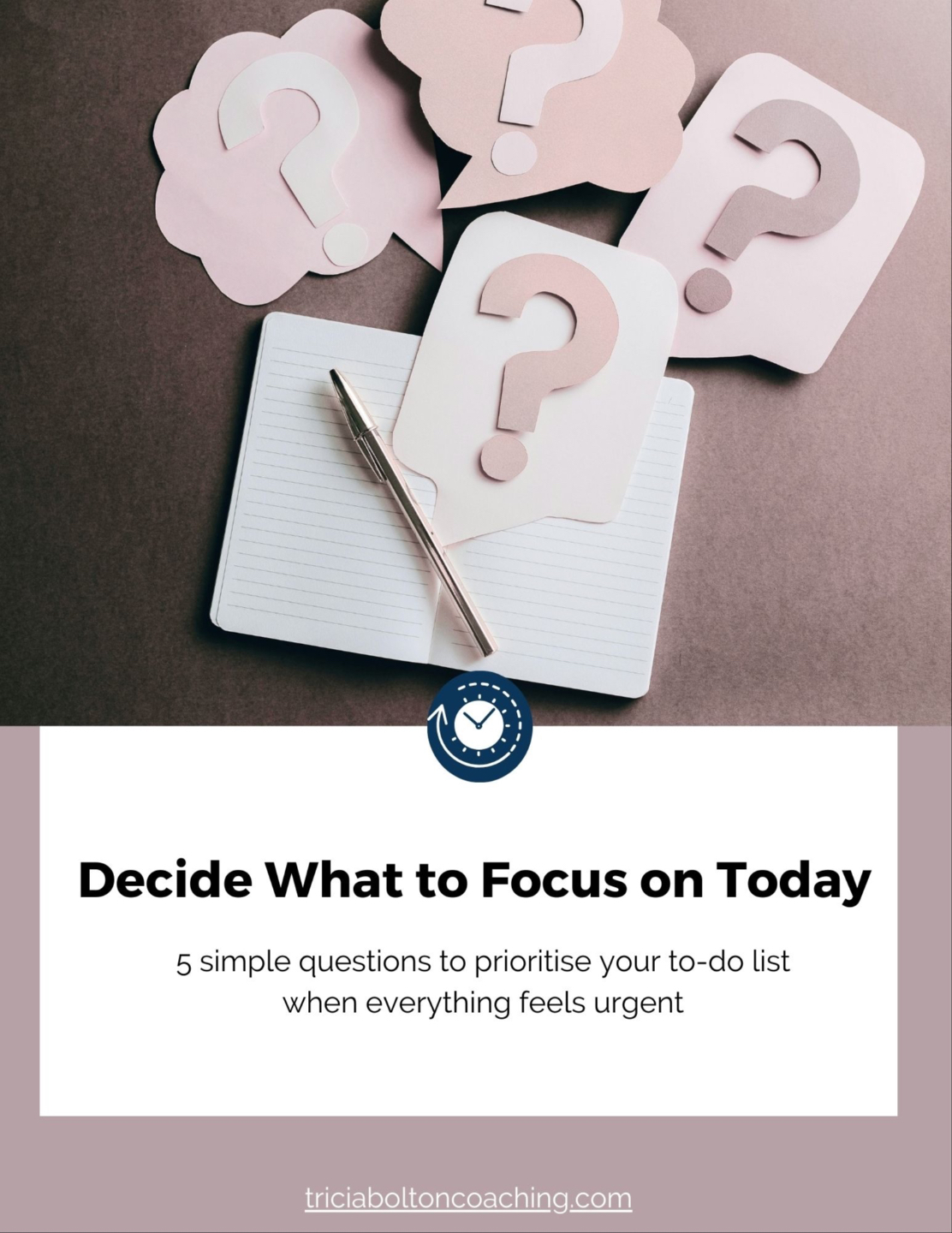Stop Saying "I Don't Have Time" (And What To Say Instead)

Every time you say "I don't have time," you're lying to yourself. Here's why this phrase keeps you stuck and what to say instead to feel empowered.
How many times this week have you said "I don't have time"?
If you're like most entrepreneurs and business owners I work with, it's probably more than you'd like to admit. It's the default response when someone asks you to join a project, attend an event, or take on something new. It feels true in the moment. It feels like a valid reason.
But here's what I've learned as a productivity coach: every time you say "I don't have time," you're not telling the truth. And that lie is keeping you stuck, stressed, and feeling like a victim of your own schedule.
In this post, I'm going to share why this phrase is more dangerous than you think, what's really happening when you use it, and the simple reframe that will help you feel more in control of your time than ever before.
Why I Hate Saying "I Don't Have Time" (But Keep Saying It Anyway)
I've noticed an old phrase creeping back into my language lately, and it's one I hate. I don't have time…
Why? Because I'm dedicating around 6 hours each week to a new coaching certification – reading, studying and practising new tools and concepts.
So, when a coaching buddy reached out and wanted me to join a mastermind with her, I said the dreaded words, "Sorry, I don't have time right now…"
The Problem With Traditional Time Management Advice
Every time management guru will tell you to audit your time, batch your tasks, or wake up earlier. But none of that works if you're still lying to yourself about what "I don't have time" really means.
Because those words aren't exactly true. Technically speaking, I do have time. I'm just choosing to prioritise my time differently. I'm saying yes to study, which means I've decided to say no to other stuff like masterminds.
What "I Don't Have Time" Really Means (And Why It Matters)
The problem with these words? They make me a victim of circumstances, ignore my power of choice and create an environment of scarcity around my time.
When you say "I don't have time," you're actually saying:
• I'm not in control of my schedule
• Other people and circumstances dictate how I spend my day
• I have no agency in how I invest my most valuable resource
• I'm overwhelmed and don't know what else to say
And here's the kicker: once you position yourself as a victim of time, you give yourself nowhere to go. You're stuck. Stressed. Resentful of all the things you "have to do" instead of the things you want to do.
The Hospital Test: Proof You Actually DO Have Time
I've talked about this before. You tell yourself you don't have time, but when a loved one is rushed to the hospital, you find the time because it matters. That's how I know those words aren't accurate.
We always find time for what truly matters. Always.
The issue isn't that you don't have time. The issue is that you haven't been honest with yourself about what you're prioritising and why.
How to Stop Being a Victim of Your Calendar
That's why I like to get real with myself – it's one of my secret strategies to always feeling like I have an abundance of time to do what I want in my life.
Getting real means not telling myself stories about my time. It means giving myself 100% accuracy about what is really going on.
Getting Real in Action
Getting real means catching myself in these stories. Exhibit A for me this week - I have less time to create my new podcast because I'm dilly-dallying with what I should call it.
See the difference?
Version 1: "I don't have time to work on my podcast."
Version 2: "I have time, but I'm choosing to spend it procrastinating on the name instead of creating content."
One version makes me powerless. The other shows me exactly where I can take action.
Disclaimer (because I'm a former-lawyer 🤣): Being honest with yourself doesn't mean beating yourself up. It does mean putting yourself back in the driver's seat of your business.
You no longer become a victim of time. You get to own your decisions SO you can make new ones about how you're investing your time.
The Simple Reframe That Can Change Everything
I'm happy with my decision to say no to the mastermind because I'm prioritising my study – that matters to me. I feel a whole lot better in this version of the story than when I was hanging with "Sorry, I don't have the time right now".
You may think it's semantics but as a productivity coach who's worked with a lot of clients I beg to differ.
One version gives you nowhere to go and makes you feel stressed.
The other opens the door to new possibilities and can make you feel empowered.
I know which version I'd prefer.
When you own your choices about time, something shifts:
• You stop resenting the things you've said yes to
• You feel more confident saying no to things that don't align with your priorities
• You reduce guilt about what you're NOT doing
• You focus better on what you ARE doing
Common Time Management Mistakes That Keep You Stuck
Before we move to the solution, let's talk about why most time management advice fails.
Mistake #1: Trying to Do More, Faster
Most productivity advice is about efficiency – how to cram more into your day. But if you're not clear on what deserves your time in the first place, you're just getting really efficient at doing the wrong things.
Mistake #2: Treating All Tasks as Equal
When you say "I don't have time," you're treating everything on your plate as equally important and equally mandatory. But that's rarely true. Some things matter more. Some things can wait. Some things shouldn't be on your plate at all.
Mistake #3: Ignoring the Power of Choice
Every single thing on your calendar is there because you said yes to it at some point. Even the "have to" items – you're choosing to keep your job, run your business, maintain certain relationships. Acknowledging that you're choosing (even when options feel limited) is empowering.
The Psychology Behind Time Scarcity
Here's what's really happening when you constantly feel like you don't have enough time:
Time scarcity is a mindset, not a reality.
Research shows that when we feel time-scarce, we make worse decisions, feel more stressed, and actually become less productive. It's a self-fulfilling prophecy.
But when we shift from "I don't have time" to "I'm choosing to prioritise X over Y," we move from scarcity to abundance. Even if the amount of time in your day hasn't changed, your relationship with that time transforms completely.
You stop feeling like time is happening TO you and start recognising that you're actively directing how you spend it.
What to Say Instead of "I Don't Have Time"
Ready for the reframe? Here it is:
Instead of: "I don't have time" Say: "I'm prioritising [X] over [Y] right now"
Examples:
• "I'm prioritising my certification over masterminds right now"
• "I'm prioritising family dinners over evening networking events"
• "I'm prioritising deep work in the mornings over early meetings"
• "I'm prioritising rest over another project"
Notice what happens when you use this language:
1. You acknowledge your agency
2. You honour what matters to you
3. You give yourself permission to make trade-offs consciously
4. You eliminate guilt because you're being intentional
Your Action Plan: Getting Real With Your Time
Here's how to start implementing this shift today:
Step 1: Catch Yourself
Pay attention this week to every time you say or think "I don't have time." Notice when it shows up – in meetings? When responding to requests? In conversations with yourself?
Step 2: Reframe It
When you catch yourself, pause and reframe: "What am I actually prioritising instead?"
Step 3: Check Your Alignment
Ask yourself: "Am I happy with this priority?" If yes, own it fully. If no, now you know where to make a change.
Step 4: Communicate Differently
When you need to say no to something, try: "I'm prioritising [X] this week, so I won't be able to [Y]." Notice how much more empowered you feel.
Frequently Asked Questions
Why do I always feel like I don't have time?
You feel like you don't have time because you're treating time as something that happens to you rather than something you control. When you shift to recognising that you're actively choosing how to spend your time (even when choices feel limited), the feeling of scarcity decreases.
How do I stop saying "I don't have time"?
Start by catching yourself every time you say or think it. Then practice the reframe: "I'm prioritising X over Y right now." The more you do this, the more natural it becomes – and the more empowered you'll feel.
Is saying "I don't have time" bad?
It's not "bad," but it's usually inaccurate and disempowering. It positions you as a victim of circumstances rather than someone who's actively making choices about their time and priorities.
What if I really DON'T have control over my time?
Even when you have limited control (demanding job, young children, health issues), you still have some agency over how you respond and what you prioritise within those constraints. Acknowledging the choices you DO have – even small ones – reduces the feeling of helplessness.
The Bottom Line: Own Your Time, Own Your Life
Remember: every "I don't have time" is really an "I'm choosing something else."
When you start owning that truth, everything changes. You stop feeling like a victim. You start feeling like the CEO of your own schedule. And paradoxically, you actually feel like you have MORE time because you're not wasting energy on guilt, resentment, or the mental gymnastics of pretending you're not making choices.
Maybe you'll change your focus once you see what you're really prioritising. Or maybe you'll feel good that you're focusing on what matters most, even if it means saying no to something else.
Either way, you win.

